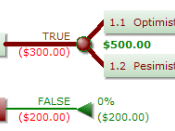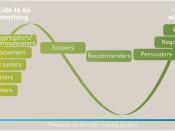The Impact of Ethics on Decision-Making
Defining the Elements
An ethically defensible decision is one that has been well thought out and looked at from all possible angles. All possible angles include everyone involved including but not limited to employees, stakeholders, and other organizations. Also, when making ethically sound decisions, it may help to look at possible solutions in terms of what good the decision will bring about, and also what harm may be the outcome.
When the ground rules are followed, one should be confident that the best solution has been chosen. One problem is that the ground rules may not necessarily be the same for everyone. This is because each of us has our own set of ethics. What is ethics? Merriam Webster's Online Dictionary defines ethics as "a : a set of moral principles or values b : a theory or system of moral values c plural but singular or plural in construction: the principles of conduct governing an individual or a group d : a guiding philosophy.
(Merriam-Webster, 2002)."
Put simply, we all live by our own set of values, and incorporate these values into the decisions we make on a daily basis. When someone's ethics are in question, then their decisions may be brought under scrutiny as well. This topic has been looked at on a widespread basis by today's media. Some of the current scandals such as the Enron scandal might not have been a problem if those involved did not have such misguided ethics.
Ground Rules
What should the ground rules be then? I think the ground rules should all be the same regardless of your personal ethics. To make sound decisions the following consensus ground rules should be addressed before a decision is made:
1.CREATE AN OPEN AND TRUSTING CLIMATE
Group members should feel free to express differing ideas and opinions without fear of attack or ridicule.
2.EXPLORE DIFFERENCE OF OPINION
This helps members to gain additional information, to clarify issues, and to seek better alternatives.
3.SUPPORT ONE ANOTHER'S IDEAS
Group members are open to and respect opinions different from their own.
4.HOLD OFF JUDGING OTHERS
Wait until all ideas have been presented and discussed before beginning to evaluate them.
5.EVALUATE IDEAS OBJECTIVELY
Evaluate each idea based on its merits. Confine disagreements to the issues and away from the personalities.
6.AVOID TRYING TO "WIN" DURING GROUP DISCUSSIONS
Discussions should not turn into a personal contest between members. Becoming too strongly attached to a particular idea can cause you to lose sight of the idea's objective merits.
7.DISCUSS IDEAS UNTIL SUFFICIENT AGREEMENT EXISTS
Deliberate with a view toward reaching majority agreement. Striving for 100% agreement, while desirable, may be unrealistic.
Once we have pinpointed any moral issues, the question "what are the ethical implications of the decision," needs to be answered. We need to look and see if the decision itself generates any moral predicaments. For instance, the decision itself may be based on sound ethics, but may not be in the best interest of the business. The pros and cons of ignoring ethics to promote a business must be reviewed. Also, we must look to see if there are ulterior motives for making the decision, or in the outcome of the decision. Is the decision fair? Such as, were all parties affected or involved in the decision-making process considered? Part of this is actually identifying these issues. If these issues are not identified, then they cannot be addressed.
Decision-Making Approaches
Philosophers developed five practical ways to evaluate ones values and deal with the ethical issue. The five approaches are The Utilitarian Approach, The Rights Approach, The Fairness or Justice Approach, The Common-Good Approach, and The Virtue Approach. The Utilitarian Approach questions the benefits and the harms each course of action produce, and which alternative will lead to the best overall consequence. The Rights Approach considers the moral rights that the people affected by the issue have, and how to resolve the problem best so that it respects those rights. The Fairness or Justice Approach seeks a way to the problem where everyone is treated equally, except when there is a just reason not to, and disqualifies favoritism or discrimination. The Common-Good Approach focuses on the compliance and preservation of social policies, social systems, institutions and environments that are beneficial to all. The Virtue Approach questions and searches for developments that will enhance one's character and improve the moral virtues of the community. These five approaches of course do not guarantee a solution, but they help identify the most important ethical considerations.
These approaches can be applied to evaluate one's business environment. Many business executives think that their organization environment is ideal. They conduct workshops to define values, display missions and goals on posters and in manuals; they conduct company orientations for the new employees and advocate the company's values and what they stand for.
Change in Ground Rules
How might the decision change the ground rules? Depending on the outcome of the decision, we may need to reevaluate the ground rules used in the decision-making process. If the outcome shows greater harm than good, then the process was probably not thorough enough. We also want to look at our conscience. Can we live with this decision? We need to be comfortable with our decisions. If we are uneasy, then again, our process was probably not thorough enough.
The goal in making decisions is to make informed decisions while still making ethical decisions. If we follow good values such as integrity, honesty, faithfulness, and compassion, we should feel secure that our decisions are sound. Generally, well thought out and ethically defensible decisions are in the best interest of all those concerned.
Conclusion
Let us, for a second go back to the problem at the beginning of this story. We left off at a point of making a decision whether to inform the owners or not of the minimal design of the classrooms in the private school. Let us first consider what would happen if we choose to disregard the problem. Suppose that one day the exact situation takes place and there are about sixty kids in one room. The floor collapses and at least ninety kids suffer injuries, maybe we got lucky and there are no deaths. Well if the school turns to sue the construction company, the company may get off easy. They did build everything correctly and they did say roughly thirty kids can occupy the room, but they failed to inform the owner that if it is more than thirty the floor will collapse. Whose fault is it? Is the fault of the engineer that new about this problem and chose to disregard it or the owners who failed to inquire? How will the engineer that was aware of this go about his conscience? Will he be able to carry out another project or sleep soundly at night, probably not. Thus there are about a hundred lives traumatized and a company's reputation ruined.
Now let explore the other alternative. If the engineer had brought the problem up, there would be a hundred happy children going to school. The project might have taken longer and it may have turned out costlier, but the profit would outweigh the expenses. The company still has its reputation, the engineer would sleep soundly at night and new projects would be born. This may have also gotten the engineer in trouble with his boss, but it is unlikely that there is a boss today that would sacrifice life today to end up in a legal battle and with a guilty conscience tomorrow.
Even though this is a made up story with many faults and discrepancies, it may still stir your conscience. Thus ethics prove to be essential in professional decision-making. The basis for all professional ethics is trust among the employees and employers, if here is no trust the company will fall apart. The employees should not be afraid to come to their boss with a problem, worried that it may cause a dilemma in ethics. They should develop and uphold the trust among each other and see to it that every decision is ethically and morally acceptable.


